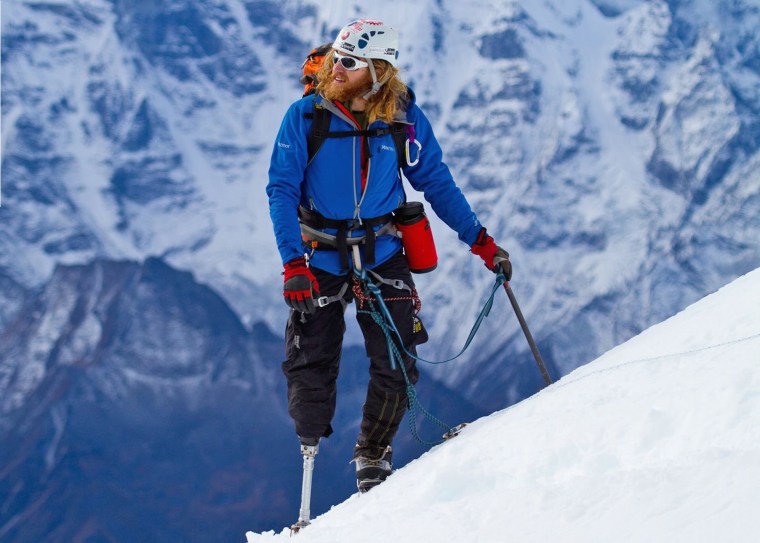They have overcome huge obstacles in the service of their country, but they haven’t conquered the biggest obstacle in the world. Not yet.
Two military veterans — a Marine who lost part of his leg in Afghanistan and a retired Army staff sergeant battling post-traumatic stress disorder — this month hope to become the first combat amputees to reach the summit of Mount Everest.
In climbing 29,029 feet to the top of the world’s mountain, they also hope to inspire other wounded service members to “accomplish their goals and have a meaningful life.”

“Not only will I be climbing the tallest mountain in the world but I’ll be doing it while raising issues for veterans — most especially post-traumatic stress which has affected me personally and many of the soldiers with whom I’ve served,” said Chad Jukes, whose right leg was amputated below the knee in 2006 after his vehicle struck a roadside bomb in northern Iraq.
More than 1,645 members of the U.S. military have lost a major limb since 2001, and thousands more have suffered a traumatic brain injury. Meanwhile, a study by the RAND Corporation concluded that at least 20 percent of the 2.7 million veterans of the Iraq and Afghanistan wars have PTSD and/or depression — although many doctors believe the true figure could be far higher.
Jukes — a 32-year-old retired staff sergeant from Ridgeway, Colorado — served six-and-a-half years in Iraq and Afghanistan and has suffered from PTSD since leaving the Army.
He is climbing alongside other servicemen and veterans as part of a team from U.S. Expeditions and Explorations (USX), a non-profit which aims to help those with PTSD by guiding their transition back to civilian life.
The group arrived at base camp in Nepal on April 25 and hope to reach the summit on or around May 20.
Making a separate climb is former Marine staff sergeant Charlie Linville. He lost his foot to a below-the-knee amputation in 2013 after fighting for over a year to save it following an IED blast in Afghanistan.
Linville is climbing with the Heroes Project, a non-profit that helps injured veterans reach some of the highest summits of the world but which has yet to conquer Everest.
The 30-year-old father-of-two has already made two attempts on Everest — one in 2014 that was canceled after a tragic avalanche killed 16 Sherpas and another in 2015 that was canceled when Nepal was devastated by a huge earthquake.
This time, his group hopes to finally reach the summit in mid-May.
“I’m definitely a little nervous,” Linville said in a video from base camp late last month.“Knowing that I’ve been training for months getting ready for the mountain, and then finally seeing it."
He added: “The Everest climb has never been about myself, it has always been about the Heroes Project ... Hopefully we can inspire others to get up and accomplish their goals and have a meaningful life. That’s what the whole goal is.”
Climbing Everest involves not just a steep ascent but substantial danger, and 70 percent of attempts on average end in failure. But Jukes and Linville are not your average climbers.
“I can show people that, yeah. I’ve got one leg but I can climb this mountain,” Jukes said in a video message last month before his departure. “Yeah, I’ve got a minor traumatic brain injury but I can climb this mountain. Yeah, I have PTSD but I can climb this mountain.”
He said the ascent will rely on his ability to assess risk and mitigate hazards — plus personal strength and teamwork.
But the expedition isn't just a challenge, Jukes said. It's also part of a healing process.
"Just being in mountains I feel a sense of calm that don’t experience in my day-to-day life," he said. "I’m able to revel in the beauty of the natural world around me and also, specifically with climbing, I’m able to put myself in a situation where I can achieve something amazing."
